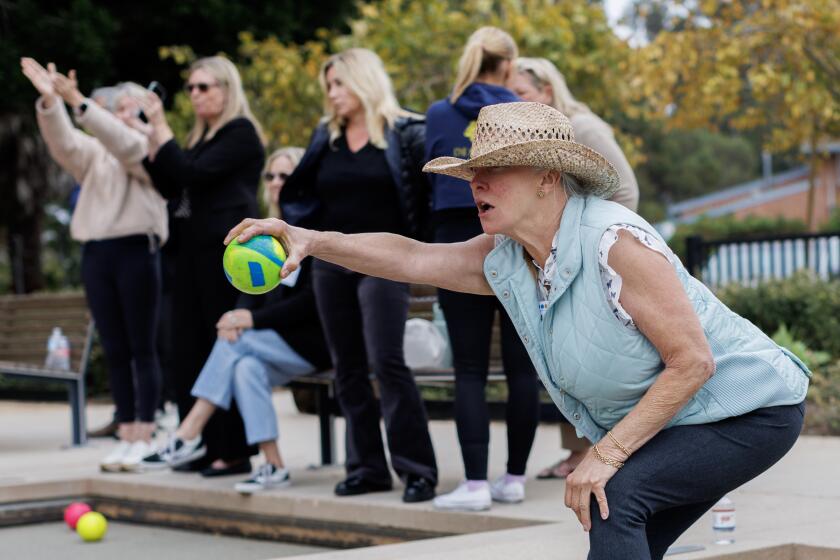Be grateful for what you have. It may help you live longer

Death may be inevitable, but that hasn’t stopped health researchers from looking for ways to put it off as long as possible. Their newest candidate is something that’s free, painless, doesn’t taste bad and won’t force you to break a sweat: Gratitude.
A new study of nearly 50,000 older women found that the stronger their feelings of gratitude, the lower their chances of dying over the next three years.
The results are sure to be appreciated by those who are naturally inclined toward giving thanks. Those who aren’t may be grateful to learn that with practice, they might be able to enhance their feelings of gratitude and reap the longevity benefits as well.
“It’s an exciting study,” said Joel Wong, a professor of counseling psychology at the University of Indiana who researches gratitude interventions and practices and wasn’t involved in the new work.
Mounting evidence has linked gratitude with a host of benefits for mental and physical health. People who score higher on measures of gratitude have been found to have better biomarkers for cardiovascular function, immune system inflammation and cholesterol. They are more likely to take their medications, get regular exercise, have healthy sleep habits and follow a balanced diet.
Gratitude is also associated with a lower risk of depression, better social support and having a greater purpose in life, all of which are linked with longevity.
However, this is the first time researchers have directly linked gratitude to a lower risk of earlier death, Wong and others said.
“It’s not surprising, but it’s always good to see empirical research supporting the idea that gratitude is not only good for your mental health but also for living a longer life,” Wong said.
Exercise is good for you. So is a full night’s sleep. But the easiest way to boost your chances of reaching your senior years in good physical, mental and cognitive health is to turn off your TV, new research suggests.
Study leader Ying Chen, an empirical research scientist with the Human Flourishing Program at Harvard University, said she was amazed by the dearth of studies on gratitude and mortality. So she and her colleagues turned to data from the Nurses Health Study, which has been tracking the health and habits of thousands of American women since 1976.
In 2016, those efforts included a test to measure the nurses’ feelings of gratitude. The women were asked to use a seven-point scale to indicate the degree to which they agreed or disagreed with six statements, including “I have so much in life to be thankful for” and “If I had to list everything I felt grateful for, it would be a very long list.”
A total of 49,275 women responded, and the researchers divided them into three roughly equal groups based on their gratitude scores. Compared with the women with the lowest scores, those with the highest scores tended to be younger, more likely to have a spouse or partner, more involved in social and religious groups, and in generally better health, among other differences.
The average age of nurses who answered the gratitude questions was 79, and by the end of 2019, 4,068 of them had died. After accounting for a variety of factors such as the median household income in their census tract, their retirement status, and their involvement in a religious community, Chen and her colleagues found that the nurses with the most gratitude were 29% less likely to have died than the nurses with the least gratitude.
Then they dug deeper by controlling for a range of health issues, including a history of heart disease, stroke, cancer and diabetes. The risk of death for the most grateful women was still 27% lower than for their least grateful counterparts.
When the researchers considered the effects of smoking, drinking, exercise, body mass index and diet quality, the risk of death for the nurses with the most gratitude remained lower, by 21%.
Finally, Chen and her colleagues added in measures of cognitive function, mental health and psychological well-being. Even after accounting for those variables, the mortality risk was 9% lower for nurses with the highest gratitude scores.
The findings were published Wednesday in JAMA Psychiatry.
Long-term data from nearly 400,000 Americans suggests that multivitamins don’t reduce the risk of premature death.
Although the study shows a clear link between gratitude and longevity, it doesn’t prove that one caused the other. While it’s plausible that gratitude helps people live longer, it’s also possible that being in good health inspires people to feel grateful, or that both are influenced by a third factor that wasn’t accounted for in the study data.
Sonja Lyubomirsky, an experimental social psychologist at UC Riverside who studies gratitude and was not involved in the study, said she suspects all three things are at work.
Another limitation is that all of the study participants were older women, and 97% of them were white. Whether the findings would extend to a more diverse population is unknown, Wong said, “but drawing on theory and research, I don’t see a reason why it wouldn’t.”
There can be downsides to gratitude, the Harvard team noted: If it’s tied to feelings of indebtedness, it can undermine one’s sense of autonomy or accentuate a hierarchical relationship. Lyubomirsky added that it can make people feel like they’re a burden to others, which is particularly dangerous for someone with depression who is feeling suicidal.
But in most cases, gratitude is an emotion worth cultivating, Lyubomirsky said. Clinical trials have shown that gratitude can be enhanced through simple interventions, such as keeping a gratitude journal or writing a thank-you letter and delivering it by hand.
“Gratitude is a skill that you can build,” she said.
And like diet and exercise, it appears to be a modifiable risk factor for better health.
Lyubomirsky has found that teenagers who were randomly assigned to compose letters of gratitude to their parents, teachers or coaches took it upon themselves to eat more fruits and vegetables and cut back on junk food and fast food — a behavior not shared by classmates in a control group. Perhaps after reflecting on the time, money and other resources invested in them, the teens were inspired to protect that investment, she said.
More research will be needed to see whether interventions like these can extend people’s lives, but Chen is optimistic.
“As the evidence accumulates, we’ll have a better understanding of how to effectively enhance gratitude and whether it can meaningfully improve people’s long-term health and well-being,” she said.









